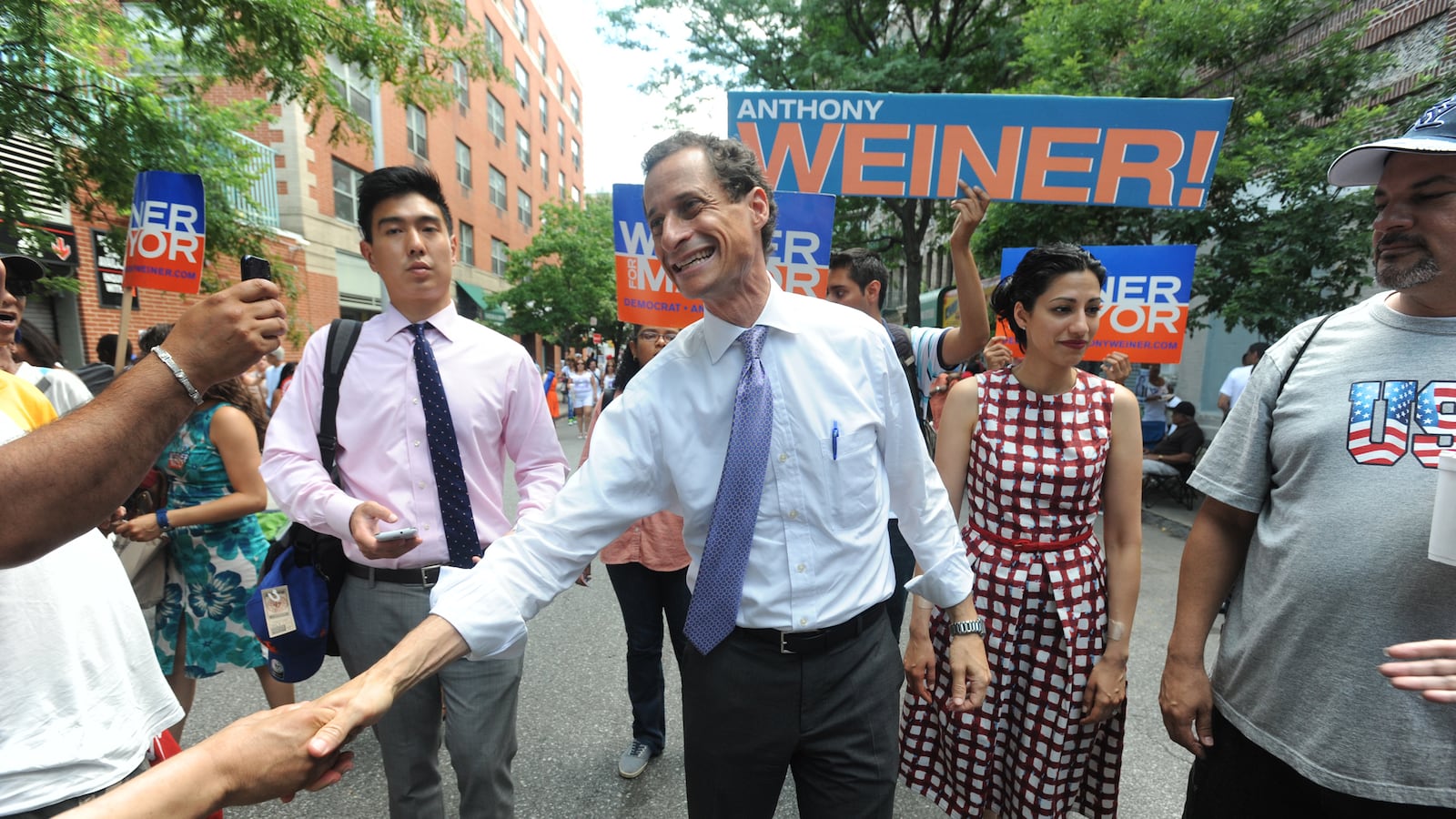It’s not easy to tell 68 lies in eight minutes. But New York City, you have that man among you, and he still wants to be your mayor.

Of course I’m talking about Anthony Weiner, whose 2013 redemption tour was going so well until the latest revelations that he kept sending dirty texts well after he resigned from Congress in 2011.
But anyone who was surprised by the news that Weiner didn’t tell the whole truth to voters in May when he announced his candidacy was not paying attention two years ago. After Weiner accidentally sent a picture of his man parts to 45,000 Twitter followers, he spent the next three weeks deflecting, denying, and outright lying about what he had done before finally resigning his seat.
I had a front-row seat for one particularly bizarre performance on June 1, 2011, as the House of Representatives debated an increase to the debt ceiling. On that Wednesday, while members of Congress cast budget votes on the House floor, Weiner left the voting and went to a nearby area of the Capitol known as the Speaker’s Lobby, where journalists typically wait to interview congressmen about issues of the day. Anyone who does not want to talk to reporters knows to skip a walk through the scrum.
But instead of staying out of sight, Weiner headed straight into the Speaker’s Lobby to a pack of reporters, including me, and announced, “Fire away.”
What followed was eight minutes of nearly uninterrupted fabrication, 68 individual lies by my count, which put the then-congressman somewhere on the continuum between creepy pervert, compulsive liar, and mentally unstable person.
In fairness to Weiner, he told some of the same lies multiple times during the press gaggle. Some of the lies he told were big; some were small. Some were misleading observations, while others were flat-out whoppers.
Laced between the lies were inexplicable doses of innuendo, with Weiner apologizing for being “stiff” the day before, explaining that he had been “poking” Clarence Thomas over the weekend on Twitter, and speculating that the Twitter imbroglio could prove to be “the point of al Qaeda’s sword.” At one point he asked the group of reporters to take a step away from him. “But not you,” he said to a young woman. “You can stand as close as you like.”
The female reporters exchanged glances with each other as if to say, “Is this really happening?” but we kept our recorders going because the spectacle was so immense.
Between ill-timed penis jokes and soft-core sexual harassment, Weiner spun an elaborate tale of innocently sitting in his New York apartment days earlier, watching an NHL game, and noticing a mysterious hacker post a photo of a man in his underwear to his Twitter account.
“I was tweeting at the time. I saw it! I was tweeting about hockey at the time,” Weiner explained. “My TiVo had eaten the final 15 minutes of an exciting hockey game. I was furious ... But I saw [the picture]. I deleted it. I deleted it! One person got the photograph; this person never got it. Whatever.”
Weiner went on to declare for the press “what we know for sure” and “what we don’t know for sure,” never letting on the detail that only he knew—that he had sent the picture of himself to a 21-year-old college student, intending it for her eyes only.
“We don’t know where the photograph came from,” he said. Lie.
“We don’t know for sure whether it’s been manipulated.” Lie.
“I have had problems with my Facebook before. The things might be connected.” Lie.
“We know for sure I didn’t send this photograph. We know for sure that someone did. We know for sure that one of my followers’ names was inserted. We know for sure that she has put out a statement to say she doesn’t know me, and I certainly don’t know her.” Lie. Lie. Lie. Lie. Lie.
Added to that disinformation were more lies about the possible motives of the alleged hacker, his reasons for not alerting the Capitol Police, and declarations that, to keep recent events in perspective, he “had to draw the line somewhere” with the questions he would answer from reporters.
But as offended as Weiner sought to appear—as a federal official who had supposedly been the victim of hackers—he also took pains to downplay the incident, saying he thought it was probably someone playing a prank “to derail or distract me” or possibly just making fun of his name. “Maybe if my name was hamburger, the picture would have been different,” he joked.
To catch the “real” tweeter, Weiner explained that he had hired an Internet security firm to investigate. Unfortunately for Weiner, this one detail might be true. The New York Daily News reports that Weiner did pay a private security firm $45,000 from his campaign funds as the sexting scandal engulfed him in 2011.
Although I technically scored the sham investigation as a lie for my overall count, if Weiner hired the firm as a part of a cover-up, using campaign funds to pay for it could be worse than a lie. It could be illegal.
But don’t worry, New York. Weiner made a promise in June 2011 that should certainly still hold true. “If it turns out there is something larger going on here,” he vowed to reporters that day in the Speaker’s Lobby, “we’ll take the requisite steps.”






